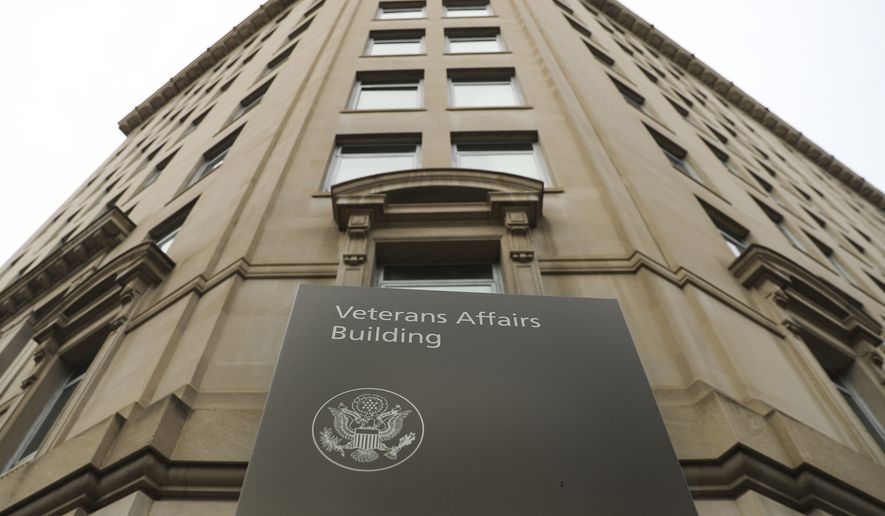The Department of Veterans Affairs this week will stop paying employees in health care jobs for time spent on union activities as the Trump administration cracks down on the practice known as “official time,” which costs taxpayers more than $100 million per year.
The VA policy will prevent about 430 unionized physicians, registered nurses, dentists and other agency employees from performing union representation duties such as handling grievances and negotiations. It takes effect Thursday.
Jacquelyn Hayes-Byrd, acting VA assistant secretary for human resources and administration, said the department will “repudiate” parts of its collective bargaining agreements reached during the Obama administration with unions that authorize official time. She said federal law allows the agency to take such a step if it affects “direct patient care.”
“It’s common sense,” she said. “Allowing health care workers to do taxpayer-funded union work instead of serving veterans impacts patient care negatively.”
As an example of wasted money, the agency cited one nurse who was elected as a local union official and whose salary was funded 100 percent by taxpayers, although she no longer provided medical care to patients and did not maintain a nursing license.
Although the move affects a relatively small number of VA employees, it reflects a larger push by President Trump to reduce “official time” across the government. Labor analysts say the practice cost taxpayers an estimated $177 million in fiscal 2016, with federal employees devoting about 3.6 million work hours to union business.
“Union official time enables thousands — at least 12,000 — federal employees to perform union business on the taxpayer’s dime,” said Trey Kovacs, a labor policy analyst at the Competitive Enterprise Institute. “VA employees spent nearly 1.1 million hours on union leave, which is almost one-third of all official time use.”
Mr. Kovacs noted that such data are estimates. The Government Accountability Office reported last year that the VA can’t accurately track the amount of work time employees spend on union duties because it lacks “a standardized way for its facilities to record and calculate official time.”
Mr. Trump in May signed executive orders to rein in the power of public-sector labor unions, saying the actions were needed to improve efficiency in the federal bureaucracy and make government more accountable. Part of his actions was to reduce significantly the amount of time and money devoted to union members’ “official time.” After government unions sued, U.S. District Judge Ketanji Brown Jackson nullified key provisions of the executive orders. The Trump administration has appealed.
This spring, the Education Department cut off negotiations with the American Federation of Government Employees on a new collective bargaining agreement and implemented a contract that curtailed official time, among other benefits. The union filed an unfair labor practice complaint with the Federal Labor Relations Authority.
The VA is taking similar steps, notifying AFGE that its collective bargaining agreement will be changed unilaterally because certain provisions “conflict with federal law.”
Unions representing VA employees are calling the move to curtail official time an attack on workers’ rights.
“Removing access to [official] time is like asking the fire department to operate without firetrucks or a fire hose — and the result will be just as disastrous for our veterans,” said AFGE National President J. David Cox Sr. “Make no mistake: This is an attempt to silence the voices of VA employees at a time when such oversight is more critical than ever. Clinicians use official time to raise concerns about patient safety, access to care and staffing shortages.”
He said the VA should hire more staff to improve patient care for veterans.
“The VA is touting how this move will return nearly 430 medical professionals to their health care jobs full time, yet there are 45,000 vacant positions in the VA, including 35,000 vacant health care positions,” Mr. Cox said. The VA, the second-largest agency in the federal government behind the Department of Defense, has about 380,000 employees.
National Nurses United Executive Director Bonnie Castillo accused VA Secretary Robert Wilkie of attempted union-busting. She said her union will challenge the action.
Mr. Kovacs testified to Congress this year to urge lawmakers to end the use of official time in government agencies.
“The Veterans Department did the right thing by putting medical professionals back to work for veterans,” he said. “Unfortunately, the VA had been permitting hundreds of employees to conduct union business for years, which cost the taxpayer tens of millions of dollars annually. No federal employee should be allowed to spend their work hours on an activity other than the job they were hired to do. Other federal agencies should follow the Department of Veterans Affairs’ lead and move federal employees back to serving the public rather than their union.”
The GAO in 2014 reported that workers at 10 federal agencies had used 2.5 million hours of official time in fiscal 2013, an increase of 25 percent from fiscal 2006.
In fiscal 2013, the VA had the largest number by far of bargaining unit employees, with 264,991. The next-largest department was Homeland Security, with 112,739.
The Office of Personnel Management said in May that there is an urgent need to cut back on official time.
“Official time, more accurately referred to as ’Taxpayer Funded Union Time,’ is paid time spent by federal employees performing representational work for a bargaining unit in lieu of their regularly assigned work,” OPM said. “In other words, official time is treated as work time, thus is funded by the American taxpayers while no service to the taxpayer is performed.”
Taxpayer-funded costs for official time rose 9 percent, from $162.5 million in fiscal 2014 to about $177.2 million in fiscal 2016, late in President Obama’s second term, OPM said. Official-time hours across the government increased from 3.47 million to 3.63 million, or 4.76 percent.
• Dave Boyer can be reached at dboyer@washingtontimes.com.




Please read our comment policy before commenting.